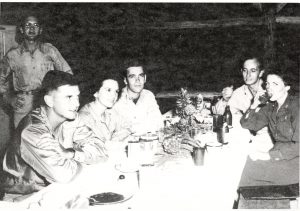Meet the former US Army flight nurses whom I interviewed for
Beyond the Call of Duty: Army Flight Nursing in World War II.
In 1986 as part of my research about flight nurse history and coping with war, I was privileged to interview 25 former US Army nurses about events of their flight nurse duty in World War II. Most of them are now deceased, but their stories live on in Beyond the Call of Duty: Army Flight Nursing in World War II.
The journal I kept of my time with each of them in 1986 when writing my dissertation offers a brief personal glimpse of these remarkable women. I am sharing edited versions of these journals, in the order in which the interviews took place. The actual interviews are in separate documents.
15th Interview
Blanche Solomon Creesy
822 MAES, 830 MAES North Atlantic
23 May 1986
I interviewed Blanche Creesy during the World War II Flight Nurses Reunion at Cocoa Beach, Florida. Blanche was one of the first women attending that I’d met. Very friendly and warm, she is very likable and fun to talk with, and became a friend rather than merely an informant.
During the reunion I was juggling being too assertive in requesting an interview with not being assertive enough. It seemed best to talk casually with a woman before introducing the idea of actually interviewing her. With this approach I could more easily ascertain which women might be good informants. One woman, for example, had interesting experiences to share, but she is quite deaf. Another woman was collecting data herself for an article she is writing. Her approach was covert, which bothered me. I talked with this woman casually and learned that she is a freelance writer with many publications to her credit, mainly in Motor Homes magazine. She was eager for me to see different photos and articles she’d brought along to the reunion, without being open to an actual interview.
When I eventually asked Blanche if she would be willing to be interviewed, she was very pleased. She commented that she hadn’t known I would want to interview her. Without realizing it, I guess I might appear intimidating to some women—the active duty major in a doctoral program who they’ve been told by Ethel Cerasale is writing their history. Blanche was easy to interview; she shared experiences willingly and spontaneously.
Blanche flew with the 822 MAES on Air Transport Command flights with patients from Newfoundland to New York, and later as part of the 830 MAES from the Azores back to Newfoundland or to Bermuda. Both were long over-water hops. Her patients were returning to the United States from Prestwick, Scotland, North Africa, and France. Blanche had patients with serious injuries on some of her flights—a soldier with a sucking chest wound to whom she had to administer oxygen continuously during flight, soldiers in full body casts. But when she was off duty, she had a good time.
Blanche loved the life of a flight nurse. Knowing that she was doing her part in the war was important to her. “When we were flying with patients, it was all business, you know—work and business.” When they didn’t have patients, the flight nurses slept as they deadheaded back to their home station. The nurses worked hard, Blanche said, “but I think most of us played hard, too, in our free time.”
One of Blanche’s stories. Blanche remembered a flight with three blind patients, two of them in litter tiers and the third one on a litter on the floor of the plane. The third patient required frequent eye irrigations. When the plane landed in the Azores, it was having problems with the wheels. The patients were off-loaded so the plane could be tested. The wheels seemed to be working, so the flight continued with patients. Blanche told the patients about the potential problem with the wheels, then spoke with the blind patients individually, “and I told them I would yell when we almost hit the ground so they could hold on really tight.” The patient on the litter on the floor said, “Lieutenant, when you leave me, tell me you’re going so I’m not left talking to myself, because the nurse in the hospital did that, and I was talking for the longest time.” Blanche almost wept. Just before the plane landed, she announced, “Hang on tight, and you’ll know when you’re rolling,” then she sat on the floor next to that patient. “The wheels rolled. We had no problem,” Blanche said. “And we all breathed a sigh of relief.”
Blanche died in 1992.


